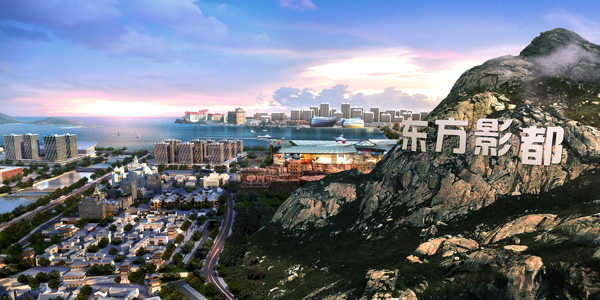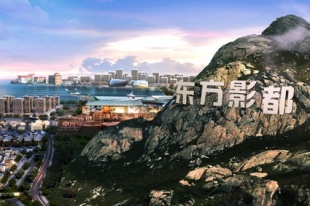Qingdao Movie Metropolis opens with a splash


Inside a soundstage in western Qingdao, Shandong province, actors from the action-thriller The Teacher are performing a series of chase-and-combat sequences for a group of onlookers.
Transfixed by the performance, the audience members-mainly a mix of movie-industry insiders and reporters-give the actors a round of applause after the scenes.
The demonstration was part of a string of events held on Saturday to celebrate the opening of the Qingdao Movie Metropolis, which is said to be the largest film-studio complex in the world.
As China's answer to Hollywood, the new "film kingdom" backed by investment from the conglomerate Dalian Wanda Group is a 50 billion yuan ($7.9 billion) project that has taken more than four and a half years to construct.
Spanning 166 hectares, the sprawling complex will include 52 state-of-the-art studios, with 30 completed in the first phase and 10 more currently under construction for the second phase.
Besides the studios, the complex is home to a film-set street lined with European and Shanghai-style architecture, a shopping mall with a theme park, several luxury hotels, a yacht club, a hospital and an international school. It also includes a 30-theater, 5,000-seat multiplex cinema, the largest in China.
Wang Jianlin, chairman of Dalian Wanda, says the massive film complex marks a milestone for the industrialization of Chinese cinema, and will help to promote Chinese films in foreign countries.
Speaking at the inauguration ceremony, Wang said the facility will firmly place Qingdao on the international cinematic circuit and turn the eastern coastal city into a global movie hub.
With a long history connected to cinema-the first documentary shot in China was made in Qingdao in 1898 and China's first movie with sound, Sing-song Girl Red Peony, was made there in 1931-the city was named by UNESCO as a "city of film" in November, the first of its kind in China.
To date, the fantasy epic The Great Wall, starring Matt Damon, and sci-fi film Pacific Rim: Uprising, headlined by John Boyega, used the Qingdao studios to shoot some special-effects sequences.
For US director Jeremy Weiss, the convenience and diversity of the film sets at the Qingdao facility were the major inspiration for The Teacher, a 20-minute short film about a German assassin's hunt for a Chinese teacher.
Featuring exotic scenes set in a German prison and a traditional Japanese hall, the movie was actually shot in one of the Wanda soundstages in six days.
"We find it interesting that we can just as easily shoot a movie in Qingdao as we do elsewhere around the world," says Weiss.
And the fact that the locations are just a few minutes' walk from each other also saves the crew a lot of time, he says.
Jia Hao, a veteran director specializing in water sequences, thinks the state-of-the-art tanks at the Qingdao facility will help stars feel safer and more comfortable in water.
The filmmaker behind the water scenes of Painted Skin: The Resurrection and Wolf Warrior 2 recently shot an underwater scene in one of the two huge tanks in the studios.
One is an indoor tank with the temperature maintained at around 32 C. The other, with a storage capacity of up to 10,000 cubic meters, has tracks to allow heavy cameras to operate underwater and a dedicated room for directors to guide the action at the bottom of the tank.
"In the past, there were only a few tanks in China and they were mostly unheated. Stars were reluctant to stay in the water for a long time. The Wanda tanks have raised the bar for filming water sequences," says Jia.
Operators from Wanda estimate that more than 500 film and television companies in China will move into the complex over the next three years, and will shoot or produce around 100 movies and television series every year.





































